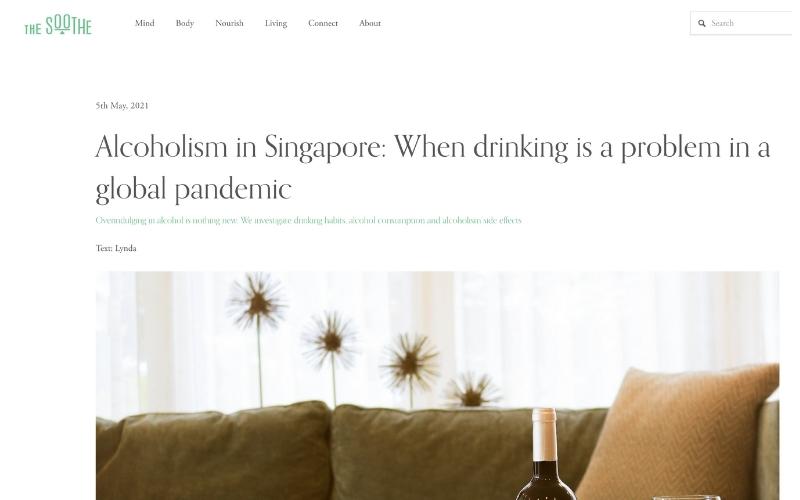Overindulging in alcohol is nothing new. We investigate drinking habits, alcohol consumption and alcoholism side effects
Text: Lynda
Singapore would never be described as a ‘boozy’ country. According to the World Health Organisation, our Red Dot has one of the lowest alcohol consumption rates in Asia. However, according to a survey published by Milieu Insight, 45 percent of respondents in Singapore stated that they had been spending more than usual on alcoholic beverages during Covid-19. But how do you know when you are teetering on a drinking problem and that alcoholism in Singapore might be a genuine issue?
More of us chose to drink at home in 2020, and in response, online retail platforms for wine and spirits boomed. Worryingly, the trend for drinking alcohol at home looks set to rise throughout 2021 as new drinking norms have emerged. In addition, as time goes on and the vaccination rollout develops, it’s surely only a matter of time before establishments serving alcoholic drinks start to open up and get back on their feet again. Therefore, we need to be mindful of alcoholism side effects and how to tell if you have a drinking problem. Here, The Soothe speaks to Maria Luedeke, director, counsellor, psychotherapist & executive coach at Aspire Counselling to find out more about alcoholism awareness and protecting your holistic health.
What do you personally define as alcoholism?
The definition of an alcoholic is really not a finite thing. Generally, any time someone’s drinking impacts their relationships, health, or daily functioning it is a problem and needs to be addressed. For some that can be 1 – 2 drinks a day or it could be binge drinking to the point of blackout or anything in between. We all have unique biochemical and social-emotional responses to alcohol and therein lies the complex relationship many of us have with it.
Have you seen a rise in alcoholism in the last 12 months?
I don’t have any solid statistics, but there’s definitely a trend towards increased drinking since last April when Singapore went into circuit breaker. People generally raised their alcohol consumption during CB and then continued as they celebrated being “out” which spiraled into more heavy drinking trends overall.
Is alcoholism in Singapore a problem you see more in females or males?
There’s a general perception that men drink more, in particular the 20-40 age range. However, just as many women can struggle with alcohol and age is not necessarily a determining factor; economic and psychological stress are greater indicators of increased alcohol consumption. In general, people in their 20s are more likely to binge drink, but the younger people are when they begin drinking alcohol, the greater the chance of developing a drinking problem later in life.
What are the common causes of over consumption?
People overdrink for a variety of reasons: for “fun”, to seek an oblivion, to escape from feelings, to feel powerful, and so on. The problem is when people over consume; it’s not just about the immediate things they may do or say and regret while drunk; it’s also the lingering impact of alcohol biologically and emotionally up to 72 hours later.
Hangovers are what most people think of as the aftermath of overindulging in alcohol, but alcohol is a depressant and it can stay in your system acting as a depressant long after your hangover has disappeared. It exacerbates depression and anxiety along with all the physical damage it does to your liver and kidneys. It stresses your heart and can even cause damage to your brain with long term, heavy drinking.
What advice do you have for people trying to get their alcohol consumption down?
Whenever you’re trying to create new healthy habits it’s important to first think of the WHY, then the HOW, and then look at what obstacles you may face and troubleshoot. Then you make a PLAN. A lot of times, drinking has become part of a routine, for example, you walk in the door after work, change your clothes and pour a glass of wine. Instead of trying not to drink after work, create another positive habit like arriving home and doing yoga or going for a walk.
It’s important to figure out what need the drinking fills in your life so you can create an alternative habit that also meets that need. For some people it’s easier to forgo drinking all together for a time period, whereas others are able to moderate their drinking successfully. It’s very individualised and depends on the person’s relationship with alcohol.
What is the best therapy, programme or technique to help alcoholism?
Working with a mental health professional trained in addiction treatment is important to address serious drinking issues. Trying to go “cold turkey” generally doesn’t work long-term and if there has been heavy drinking over a prolonged period of time it can actually be physically dangerous. If you’re ever concerned you may have a problem with drinking, it’s worth talking to a professional in Singapore to help you develop a more positive relationship with alcohol. For those with serious drinking problems, an inpatient treatment programme is usually the most efficacious because it allows for a holistic life examination which will have the best impact.





